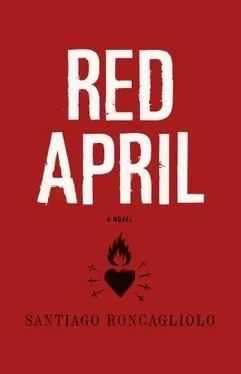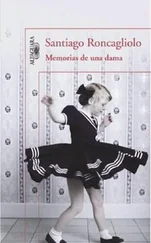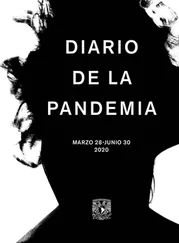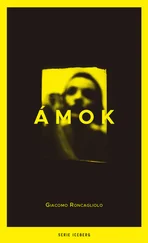He closed his eyes. It seemed that the bodies down there were mirrors that multiplied him into infinity. And he did not want to be multiplied.
Suddenly, he felt a tug. It was the soldier who had brought him there. Now he was picking him up, perhaps to make him more comfortable. He thought about Edith. He thought about fire. But the soldier made him turn and retrace his steps. Almost holding his hand, or rather his arm, almost dragging him while his legs were not sure they could support him, he took him back to the jeep where the commander was waiting for him and deposited him in front of the officer, like a child who is left at the door of a school.
“They found it last night,” said the commander. “The news came just as I was finishing your report. It's the second mass grave that has been opened in three days.”
The Associate District Prosecutor did not know what to say. He looked at the grave again, almost as a gesture of comprehension. Now, a peasant woman was coming down one of the hills on the other side. She tripped and rolled toward the foothills but got up and continued climbing down. Three soldiers on that side moved to block her way. The woman shouted something in Quechua. The prosecutor recognized her. It was the woman who had opened the door for him in Quinua, the mother of Justino and Edwin, Señora Carazo de Mayta.
“We've managed to keep the matter out of the press,” the commander continued, as if he had not seen her. The prosecutor looked at the officer. He had seen her, his dark glasses reflected her as she approached the edge of the pit. The soldiers took her by the arm but she pulled free and kept running and shouting. She reached the edge. She seemed to want to throw herself in. One of the soldiers pulled on her skirt. Another struggled with her, trying to drag her away. The woman refused to move. She seemed stronger than the three of them together. The third soldier took out a pistol. She did not see it. Her back was turned, she was concentrating on the grave, on her shouts. The soldier aimed his weapon at her back.
“Let's go, Señor Prosecutor,” said the commander.
The prosecutor could not look away from the woman and the soldiers. The commander put his hand on his shoulder. The prosecutor said:
“Stop them, Commander.”
But the commander said nothing, gave no order, did not raise his voice to his subordinates. Thirty meters away, the soldier continued to hesitate, holding his weapon while the woman threatened to throw herself, head first, in among the corpses. He aimed at her back, then at the back of her neck, then at her leg. The other two tried to hold her still. They shouted something at her. The prosecutor heard: “Get out of here, Mamacita, there's nothing here you should see.” The soldier with the weapon pointed the barrel at the sky. He turned to his companions. Then to the commander. The commander observed him but made no gesture. The prosecutor wanted to shout. Then he realized that nothing would change, that too many shouts serve only to hide the sound of shots. He held back his tears and said nothing. On the other side of the grave, the soldier put away his weapon and helped the other two drag the woman outside the perimeter of the security cordon.
“They would never kill a mother, Señor Prosecutor,” said the commander. “Sometimes fear makes them go too far. Sometimes they've even hit one. But they never kill them. They wouldn't do that even under orders. It's stronger than they are. It's a natural law. They can't.”
Two other soldiers came over to help. They picked the woman up and carried her past the hills. When the prosecutor climbed into the jeep to go back to Ayacucho, her shouts could still be heard among the hills. Or perhaps not, the prosecutor thought, perhaps they were only inside his head, saturated in his memories.
you behaved very bad, justino, you behaved very very bad. and i dont deserve it. i gave berth to you, i opened the black mouths of deth with you, and this is how you repay me. its not right, unnerstand? look in the mirrer, look at yourself. your a traiter.
dont look at me like that. its not my fault. its not even my desision. blood makes us strong, it doesnt hurt us. even an idiot like you can unnerstand the strenth of what were doing. were creating a new world.
but your weak. its normal. nobody can start a struggel and think hes going to win it very fast. unnerstand? itll take senturies, its allready lasted senturies. remembering is important. each life, each of the fallen, it piles up in history and dissolves in it, like tears in the rain. and its sap so that we can live, we who will die. its all the same to me, dont think its unjust.
do you hear it, justino? that voice. yes, its your brother. hes calling to you. do you hear him? didnt you want to see him? hes here, with us. down here, look at him. dont cry justino, men don't cry. leest of all men who have done what you did, what we did. we shed blood instead of tears, justino, you damn faggot. you almost deserve to live because your life is a slow painful death, but ill save you the effert, yes i will. thats what comrades are for, right? thats what were there for.
come here, thats right, like that … rest your head on my sholder. ill be with you every step of the way, i wont leave you alone. we wont leave you alone. well take you with us to the end of the rode. well take everybody who unites us to the end of the rode, everybody whose with us from the beginning of time. the moment comes closer and closer, justino. the moment of victory comes closer and closer. do you see the stains on the earth? do you see the red color of the puddels in the night? its your seed, justino, its you who waters the land so that from your guts the world weve fought so hard for will grow. enjoy it, because its the last thing your going to enjoy.
“You think we're a gang of killers. Isn't that right, Chacaltana?”
The commander's question came after a long silence, when they were already on the highway back to Ayacucho, between the mountains and the river. He was driving the vehicle himself. They were alone.
“I do not know … I do not know what you are referring to, Commander.”
“Don't act like a prick, Chacaltana. I know how to read between the lines of reports. And I know how to read faces, too. Do you think you're the only one here who knows how to read?”
The prosecutor felt obliged to explain himself.
“We waged a just war, Commander.” He said it like that, using the first person. “That is undeniable. But sometimes I have difficulty distinguishing between us and the enemy. And when that happens, I begin to ask myself what exactly it is that we fought against.”
The commander let several more minutes go by before he spoke again.
“Have you ever been in a war, Chacaltana?”
“What did you say, Señor?”
“I asked if you've been in a war. In the middle of bullets and bombs.”
The prosecutor remembered the incidents in Yawarmayo. Then he thought about the bombs, the power cuts in Lima, he remembered the night patrols, the ambulances, the buildings destroyed by explosives, the eyes of the police when they saw the mutilated, bloody bodies that came out of the wreckage. No. He had never been in a war. The commander continued:
“Have you ever felt surrounded by fire and known that your life at that moment is worth less than a piece of shit? Or have you found yourself in a town full of people and not known if they wanted to help you or kill you? Have you seen your friends falling in battle? Have you had lunch with people knowing it may be the last time, and the next time you see them they'll probably be in a box? Have you? When that happens you stop having friends because you know you'll lose them. You get used to the pain of losing them and simply try to avoid being one of the empty chairs that keep multiplying in the dining rooms. Do you know what that's like? No. You don't have the slightest idea of what that's like. You were in Lima, after all, while your people were dying. You were reading nice poems by Chocano, I suppose. Literature, right? Literature says too many pretty things, Señor Prosecutor. Too many. You intellectuals have contempt for military men because we don't read. Yes, don't make that face, I've heard your jokes, I've seen the faces of old politicians when we speak. And I understand. Our problem is that for us, reality is a pain in the balls, we've never seen the pretty things your books talk about.”
Читать дальше












